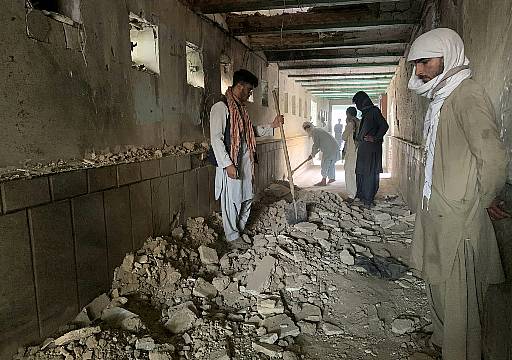Suicide bombers have attacked a Shiite mosque in southern Afghanistan that was packed with worshippers attending Friday prayers, killing at least 47 people and wounding 70, according to a Taliban official.
There was no immediate claim of responsibility for the carnage at the Fatimiya mosque in Kandahar province.
The attack came a week after a bombing claimed by the local Islamic State affiliate killed 46 people at a Shiite mosque in northern Afghanistan.
The sectarian bloodletting has raised fears that IS — an enemy of both the Taliban and the West — is expanding its foothold in Afghanistan.

Hafiz Sayeed, the Taliban’s chief for Kandahar’s department of culture and information, said 47 people had been killed and at least 70 wounded in the attack.
Murtaza, who like many Afghans goes by one name, said he was inside the mosque during the attack and reported four explosions – two outside and two inside. He said Friday prayers at the mosque typically draw hundreds of people.
Another witness, also named Murtaza, was in charge of security at the mosque and said he saw two bombers. He said one detonated explosives outside the gate, and the other was already among the worshippers inside the mosque.
He said the mosque’s security personnel shot another suspected attacker outside.
Video footage showed bodies scattered across bloodstained carpets, with survivors walking around in a daze or crying out in anguish.
Taliban spokesman Bilal Karimi earlier reported 32 dead and 68 wounded.

The extremist group, which is opposed to the ruling Taliban, views Shiite Muslims as apostates deserving of death.
IS has claimed a number of deadly bombings across the country since the Taliban seized power in August amid the withdrawal of US forces. The group has also targeted Taliban fighters in smaller attacks.
Taliban spokesman Bilal Karimi confirmed the explosion and said an investigation was under way.
The Taliban have pledged to restore peace and security after decades of war. Both the Taliban and IS adhere to a rigid interpretation of Islamic law but IS is far more radical, viewing itself as part of a worldwide Islamic caliphate that includes better-known branches in Iraq and Syria.
The Taliban and IS are Sunni Muslims but they are bitterly split by ideology and have fought each other on numerous occasions.
That Taliban have pledged to protect Afghanistan’s Shiite minority, which suffered persecution during the last period of Taliban rule, in the 1990s.







